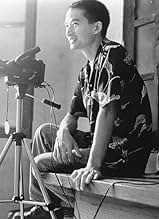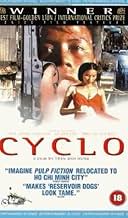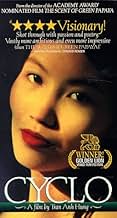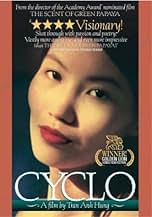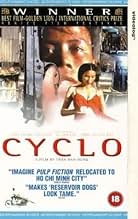IMDb-BEWERTUNG
7,1/10
5797
IHRE BEWERTUNG
Füge eine Handlung in deiner Sprache hinzuWhen a poor bicycle-taxi driver has his cyclo stolen, he is forced into a life of crime. Meanwhile, his sister becomes a prostitute.When a poor bicycle-taxi driver has his cyclo stolen, he is forced into a life of crime. Meanwhile, his sister becomes a prostitute.When a poor bicycle-taxi driver has his cyclo stolen, he is forced into a life of crime. Meanwhile, his sister becomes a prostitute.
- Auszeichnungen
- 4 Gewinne & 1 Nominierung insgesamt
Tony Leung Chiu-wai
- Poet
- (as Tony Chiu Wai Leung)
Nu Yên-Khê Tran
- Sister
- (as Tran Nu Yên-Khê)
Thinh Trinh
- Foot Fetishist
- (as Trinh Thinh)
Empfohlene Bewertungen
Another reviewer correctly pointed out this film's weakness: the script. The story starts out strong then about a third of the way through it hops the track.
After that, if you can tell what is going on and above all WHY, you're pretty good--or friends with the author.
The government of the People's Republic of Vietnam cooperated in making this film for, I suspect, political reasons. Specifically, to paint the Chinese and China in a bad light. The setting is Cholon, the Chinatown section of the old city of Saigon, the former capital of the Republic of (South) Vietnam. Saigon is now Ho Chi Minh City of course and the Chinese are almost all gone, fled from the persecution that preceded and followed the 1979 Sino-Vietnamese border war. Even in 1994 when the picture was shot relations between China and Vietnam were tense. This movie depicts Cholon as a center of drug trafficking, vice, thievery and murder in which the U.S. dollar is the most desired currency.
The camera work by Frenchman Benoit Delhomme is pure artistry. Production values are high. The leading lady Tran Nhu Yen-Khe is absolutely riveting--her exotic beauty the best thing by far about the picture. There are some interesting backgrounds, particularly a short interlude where Poet, played by Hong Kong actor Tony Leung, and Sister (Ms. Yen-Khe) escape the filthy and impoverished inner city and spend a day in the countryside. It is no accident I am sure that some of the French architecture that still stands is featured.
The minor roles are convincingly played, the characters sharply defined for all their brief appearances. It is at the center that the film's weaknesses are most evident.
After that, if you can tell what is going on and above all WHY, you're pretty good--or friends with the author.
The government of the People's Republic of Vietnam cooperated in making this film for, I suspect, political reasons. Specifically, to paint the Chinese and China in a bad light. The setting is Cholon, the Chinatown section of the old city of Saigon, the former capital of the Republic of (South) Vietnam. Saigon is now Ho Chi Minh City of course and the Chinese are almost all gone, fled from the persecution that preceded and followed the 1979 Sino-Vietnamese border war. Even in 1994 when the picture was shot relations between China and Vietnam were tense. This movie depicts Cholon as a center of drug trafficking, vice, thievery and murder in which the U.S. dollar is the most desired currency.
The camera work by Frenchman Benoit Delhomme is pure artistry. Production values are high. The leading lady Tran Nhu Yen-Khe is absolutely riveting--her exotic beauty the best thing by far about the picture. There are some interesting backgrounds, particularly a short interlude where Poet, played by Hong Kong actor Tony Leung, and Sister (Ms. Yen-Khe) escape the filthy and impoverished inner city and spend a day in the countryside. It is no accident I am sure that some of the French architecture that still stands is featured.
The minor roles are convincingly played, the characters sharply defined for all their brief appearances. It is at the center that the film's weaknesses are most evident.
Xich lo is a highly disturbing movie which manages to combine aspects of many cinematic traditions to make something new. It seems that the director held European cinematic and directorial traditions very high, and that is plainly visible in this movies. But the use of colours that somehow seem to move the soul can only be asian.
The humdrum of the city does not let up. The movie depicts a vicious cycle of abuse, extortion and violence. Le cyclo's attempt to get justice after his cyclo has been stolen is futile at first. Angry, he seeks help from le poete. This leads him into a spiral of violence, drugs and insanity. The fact that the actors do not have names, simply lables, such as "le cyclo," "le poete", and "le grand-pere," seem to reinforce the futileness of life in such conditions.
There is a strong undercurrent of frustration in this movie. Le poete, pimping out his girlfriend to fetishists whose pleasure does not come from the sexual act. He wants to keep her virtue for himself, but of course, this is folly. And even sadder is the le grand-pere, who is old, and sick, and yet, has to perform back breaking work to get by in life. Given a chance to earn some money, he rejects it, sticking by his principles. But ultimately, this does not get him anywhere.
So what is one to do? Being honest doesn't help you get anywhere. Neither does being a gangster. Or a madame. In the end, this is the question that remains unanswered...or to which there is no answer.
The humdrum of the city does not let up. The movie depicts a vicious cycle of abuse, extortion and violence. Le cyclo's attempt to get justice after his cyclo has been stolen is futile at first. Angry, he seeks help from le poete. This leads him into a spiral of violence, drugs and insanity. The fact that the actors do not have names, simply lables, such as "le cyclo," "le poete", and "le grand-pere," seem to reinforce the futileness of life in such conditions.
There is a strong undercurrent of frustration in this movie. Le poete, pimping out his girlfriend to fetishists whose pleasure does not come from the sexual act. He wants to keep her virtue for himself, but of course, this is folly. And even sadder is the le grand-pere, who is old, and sick, and yet, has to perform back breaking work to get by in life. Given a chance to earn some money, he rejects it, sticking by his principles. But ultimately, this does not get him anywhere.
So what is one to do? Being honest doesn't help you get anywhere. Neither does being a gangster. Or a madame. In the end, this is the question that remains unanswered...or to which there is no answer.
"Cyclo" is one of the greatest independent movies ever made. Vietnamese Auteur Tran Anh Hung shows how by accident violence becomes dominant in the life of a poor, young worker toiling in the streets of Saigon. Brilliantly shot with sometimes shocking and very intimate close-ups of violence and perversion, this movie deserves more attention. Besides "Cyclo" is also a documentary about the sad daily street life in giant third world cities and the permanent fight to survive.
8=G=
"Cyclo" tells of an impoverished Saigon family whose son (Cyclo) turns to crime and whose daughter turns to prostitution as a matter of economic survival. A magnificent accomplishment in cinematography, there's little new to be found in the film's somewhat muddled story which is told almost exclusively with the camera as Oscar winning director Anh Hung Tran demonstrates mastery over the lens in delivering this tapestry of pictures which captures the beauty and blight of a bustling Vietnamese city. Not for everyone, "Cyclo" will play best with those who appreciate true artistry in film.
"Cyclo" begins with neo-realist naturalism, as a young man struggles day to day driving his cycle taxi in modern day Vietnam. His father has just died, and after working his entire life as a bike-taxi driver, has nothing to leave his children, but the suggestion that they might find something nobler to do with their lives. The young man spends his days navigating the alleys and the side streets for the quickest routes and attempting to avoid collisions with other bike taxi drivers who have divided the city into turfs and gangs, of who can pick up customers where.
One day his taxi is stolen, and to repay the taxi's owner (a local lady crime boss); he has to take on a series of petty crimes to pay the debt. The young man is never given a name; the credits refer to him as "Cyclo", his sister as "sister" etc. His sister(played by the gorgeous Tran Nu Yen-Khe begins a tenuous relationship with the boss of the gang Youth works for, a silent constantly smoking man called "Poet" played by the always excellent Tony Leung.
By relationship I mean he pimps her out to old business men provided they "not touch her", instead she indulges their foot and urine fetishes, in at first disturbing and then increasingly reflective and resigned scenes. The Poet rarely speaks but we hear his poetry for time to time in voice over, obliquely appearing and disappearing. The first half of the film focuses more on Cyclo getting in over his head with the gang, stealing, transporting drugs,and lighting a rival building on fire with a Molotov cocktail.
The second half shows us more of the "Poet" and "the Sister". Dialog is sparse throughout, but the sister seems to only really exist in relation to the poet, he pimps her out, but not too much. That may be going too far, as we do get a "sense" that her indulging the fetishists is more amusing and certainly less physically tiring than the work she was doing before. Leung's apartment becomes a kind of club house for the girls, a paradoxical bordello of innocence. The Poet is corrupt but wants to keep some aspects of his life pure. There are scenes where he is beaten by his father and collapses into sudden helpless boyhood, and a virtuoso and pivotal scene in a nightclub set to Radiohead's "Creep", in the best tradition of using pop songs to encapsulate not just moment in time (the 90's in which the film is set), but the very heart of a character. When Yorke sings "what the hell am I doing here?" it might as well be Leong singing it aloud.
As Cyclo becomes more fascinated with the power, attention, and adrenalin rush he is getting from the gang, "Poet" becomes more aloof splitting his time between the three girls he pimps, and he the lady crime boss who he serves as soldier and lover(or whore depending on how you look at it). Vietnamese/French director Ahn Hung Tran delicately weaves us in and out of violence and tranquil beauty, near psychedelic explosions of color and poetic reflections, pimps and corpses and children happily at play.
After he commits his first major crime, we see him covered in filth, as he had to escape the police in a river or tunnel. The escape isn't fully shown, and we are left with the image of the crime and then the criminal covered in what looks like s*&t; insects crawling slowly across his lips in a close up. To clean his face he puts it in a fish bowl (his only company in the dilapidated room the Poet forces him to live in.), and effectively contaminates the world of the only friend he had. It's a great visual metaphor for gang violence and corruption and its effect on community life, it just makes everything dirtier and sh*&$ier.
By the end of the film, Cyclo does not come to his senses, but implodes on himself, and get's a brief offer to escape the life he bumbled or was forced into (its implied that one of the Lady crime bosses henchman was involved in stealing Cyclo's taxi in the first place.) The crime queen's handicapped son, who is Youth's same age, is a kind of mirror image of him throughout the film; financially privileged to his economic struggle, an eternal child to his forced growing-up, the apple of his mother's eye to the deafening absence of being an orphan. Cyclo's blue neon painted face at the end is less about psychedelic freak out as it is a desperate desire to escape back to the simplicities of childhood.
The fates of the Poet, Youth, and the crime mistresses' son each reach their peak, at the same moment, showing us the product of innocence/idiocy and evil/apathy. In psychological terms this is guilty and reflective super-ego (poetic Leung) and impulsive childish Id (overgrown man-child son) on two opposite poles of self-destruction, and Ego sandwiched between the two, clinging to a faint possibility of hope/rationality.
"Cyclo" is compulsively watchable and despite its experimentations easily accessible. The films score reminded me of a Hitchcock film, and is responsible in large to the films strange atmosphere, as if a horror film lurks just beneath the surface at all times, waiting to escape. In a sense the ominous sound-scape is fitting, as there is a horror waiting to devour the characters, and it is their lives. "Cyclo's" cinematic and aesthetic techniques amount to nothing less than incredibly solid and visually breathtaking storytelling, that elevates it's well-worn concept a step above the rest.
One day his taxi is stolen, and to repay the taxi's owner (a local lady crime boss); he has to take on a series of petty crimes to pay the debt. The young man is never given a name; the credits refer to him as "Cyclo", his sister as "sister" etc. His sister(played by the gorgeous Tran Nu Yen-Khe begins a tenuous relationship with the boss of the gang Youth works for, a silent constantly smoking man called "Poet" played by the always excellent Tony Leung.
By relationship I mean he pimps her out to old business men provided they "not touch her", instead she indulges their foot and urine fetishes, in at first disturbing and then increasingly reflective and resigned scenes. The Poet rarely speaks but we hear his poetry for time to time in voice over, obliquely appearing and disappearing. The first half of the film focuses more on Cyclo getting in over his head with the gang, stealing, transporting drugs,and lighting a rival building on fire with a Molotov cocktail.
The second half shows us more of the "Poet" and "the Sister". Dialog is sparse throughout, but the sister seems to only really exist in relation to the poet, he pimps her out, but not too much. That may be going too far, as we do get a "sense" that her indulging the fetishists is more amusing and certainly less physically tiring than the work she was doing before. Leung's apartment becomes a kind of club house for the girls, a paradoxical bordello of innocence. The Poet is corrupt but wants to keep some aspects of his life pure. There are scenes where he is beaten by his father and collapses into sudden helpless boyhood, and a virtuoso and pivotal scene in a nightclub set to Radiohead's "Creep", in the best tradition of using pop songs to encapsulate not just moment in time (the 90's in which the film is set), but the very heart of a character. When Yorke sings "what the hell am I doing here?" it might as well be Leong singing it aloud.
As Cyclo becomes more fascinated with the power, attention, and adrenalin rush he is getting from the gang, "Poet" becomes more aloof splitting his time between the three girls he pimps, and he the lady crime boss who he serves as soldier and lover(or whore depending on how you look at it). Vietnamese/French director Ahn Hung Tran delicately weaves us in and out of violence and tranquil beauty, near psychedelic explosions of color and poetic reflections, pimps and corpses and children happily at play.
After he commits his first major crime, we see him covered in filth, as he had to escape the police in a river or tunnel. The escape isn't fully shown, and we are left with the image of the crime and then the criminal covered in what looks like s*&t; insects crawling slowly across his lips in a close up. To clean his face he puts it in a fish bowl (his only company in the dilapidated room the Poet forces him to live in.), and effectively contaminates the world of the only friend he had. It's a great visual metaphor for gang violence and corruption and its effect on community life, it just makes everything dirtier and sh*&$ier.
By the end of the film, Cyclo does not come to his senses, but implodes on himself, and get's a brief offer to escape the life he bumbled or was forced into (its implied that one of the Lady crime bosses henchman was involved in stealing Cyclo's taxi in the first place.) The crime queen's handicapped son, who is Youth's same age, is a kind of mirror image of him throughout the film; financially privileged to his economic struggle, an eternal child to his forced growing-up, the apple of his mother's eye to the deafening absence of being an orphan. Cyclo's blue neon painted face at the end is less about psychedelic freak out as it is a desperate desire to escape back to the simplicities of childhood.
The fates of the Poet, Youth, and the crime mistresses' son each reach their peak, at the same moment, showing us the product of innocence/idiocy and evil/apathy. In psychological terms this is guilty and reflective super-ego (poetic Leung) and impulsive childish Id (overgrown man-child son) on two opposite poles of self-destruction, and Ego sandwiched between the two, clinging to a faint possibility of hope/rationality.
"Cyclo" is compulsively watchable and despite its experimentations easily accessible. The films score reminded me of a Hitchcock film, and is responsible in large to the films strange atmosphere, as if a horror film lurks just beneath the surface at all times, waiting to escape. In a sense the ominous sound-scape is fitting, as there is a horror waiting to devour the characters, and it is their lives. "Cyclo's" cinematic and aesthetic techniques amount to nothing less than incredibly solid and visually breathtaking storytelling, that elevates it's well-worn concept a step above the rest.
Wusstest du schon
- WissenswertesMade and banned in Vietnam. Criticised as too 'westernised' in its gritty and unrelenting portrayal of urban poverty in the country. The film has nevertheless received international acclaim, winning the Golden Lion Award in Venice in 1995.
- VerbindungenReferenced in Dog Park - Bei Fuß, Liebling! (1998)
- SoundtracksCreep
Written by Albert Hammond, Mike Hazlewood, Thom Yorke, Jonny Greenwood, Colin Greenwood, Ed O'Brien and Phil Selway
Performed by Radiohead
Top-Auswahl
Melde dich zum Bewerten an und greife auf die Watchlist für personalisierte Empfehlungen zu.
- How long is Cyclo?Powered by Alexa
Details
- Erscheinungsdatum
- Herkunftsländer
- Offizieller Standort
- Sprache
- Auch bekannt als
- Xích Lô
- Drehorte
- Produktionsfirmen
- Weitere beteiligte Unternehmen bei IMDbPro anzeigen
Box Office
- Bruttoertrag in den USA und Kanada
- 284.692 $
- Eröffnungswochenende in den USA und in Kanada
- 38.109 $
- 4. Aug. 1996
- Weltweiter Bruttoertrag
- 284.692 $
Zu dieser Seite beitragen
Bearbeitung vorschlagen oder fehlenden Inhalt hinzufügen


